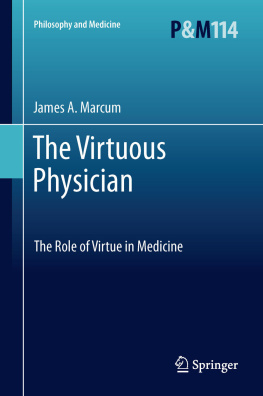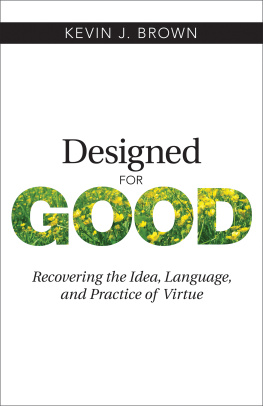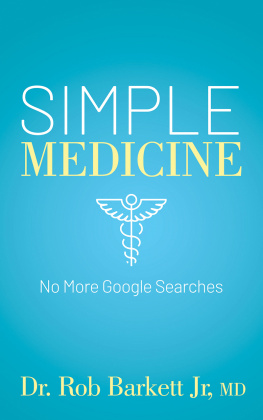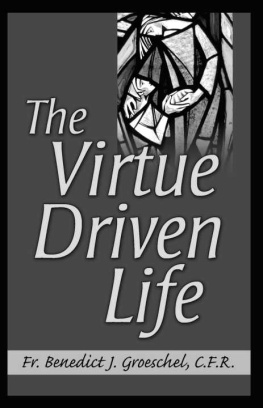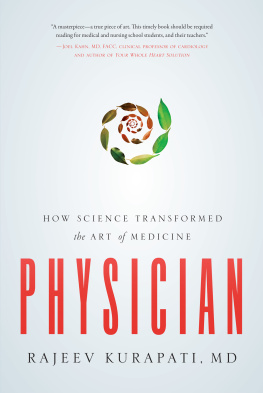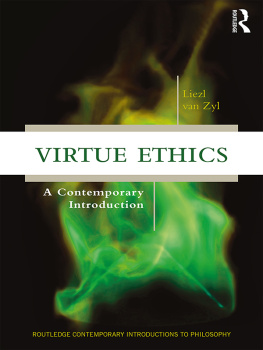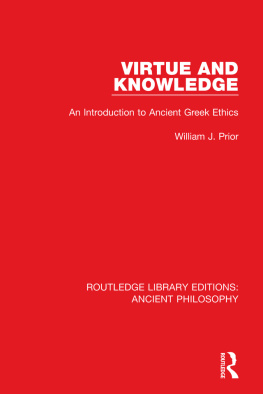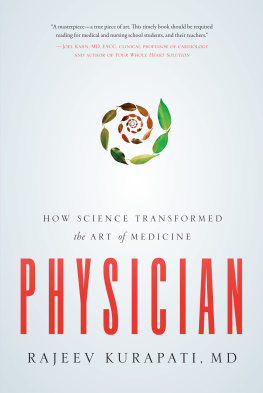In this section, I expound upon the quality-of-care and professionalism crises to provide a backdrop for motivating the need for a notion of virtuous physician. Although medical science and technology have produced, during the twentieth century, miraculous cures for many diseases such as infectious diseases, patients are often dissatisfied with the quality-of-care received from modern medical professionals. I have a deep concern, acknowledges Arthur Kleinman, that at the same time that we are enabling doctors to become technologically effective we are disabling them from being humanly compassionate and responsive (Blumer and Meyer, A related crisis is professionalism, in which a variety of factors deprofessionalizes medical personnel. According to Edmund Pellegrino, the [medical] profession is losing its commitment to the kind of character traits requisite for protection of the welfare and interests of patients (2002a, p. 384).
The above crises are products of two clashing culturesthe scientific and the humanistic. Patients seek from professional caregivers not only scientific or technical cures for or management of their physical or organic ailments but also humane care for the psychological, emotional, and existential dimensions of those ailments. Modern medicine, however, often emphasizes technical cure and management of disease over humane care, and a technical professional character over a humane one. This emphasis on the scientific or technical begins with the education and training of physicians, who are obliged to meet scientific requirements as undergraduates for entrance into medical schoolgenerally with no requirements in the humanities. And, once in medical school, the scientific and technical training in medicine of prospective physicians often brackets from the clinical consultation the patients illness experience and any emotions associated with it. This training generally results in a medical professional who is emotionally detached from what the patient feels or experiences and who thereby appears uncaring to the patient.
1.1.1 Quality-of-Care Crisis
Although physicians always presume the highest quality of healthcare in their practice, quality became a critical issue in the early 1970s with the proposal of the federal HMO Act (Caper,
In the following decade, the healthcare quality issue took on new life (Caper, ).
In an effort to bring some semblance of accord to the debate over quality-of-care, Steffen (
During the 1980s, the spiraling costs of the Medicare program prompted the U.S. Congress to examine quality medical care and its assessment. The Congress charged the Institute of Medicine (IOM), a division of the U.S. National Academy of Sciences, with the task. In 1990, the IOM released a two-volume report, Medicare: a strategy for quality assurance , detailing its findings and recommendations., p. 4). The definition represents the consensus of around one hundred definitions in the literature. In addition, the report cites eight characteristics of quality medical care, selected from eighteen. The characteristics range from the scale of quality to technological restraints on care. Although the definition struck a chord with many, it failed in one important aspectit over emphasized the technical or practical nature of medical care.
In the lead article to a series of six articles on the quality issue in medicine, which appeared in the New England Journal of Medicine , David Blumenthal (, p. 892). Although he does not name or develop this aspect of quality medical care, others do.
Besides the technical or practical dimension of quality medical care, Donabedian (, p. 1137). Both Donabedian and Caper claim that medical professionals too often ignore the interpersonal dimension of healthcare but that patients do not. Part of the reason why physicians are likely to ignore this dimension of quality healthcare is that the interpersonal dimension is too subjective, making it almost impossible to measure accurately by standard criteria used to measure the technical dimension of quality medical care.
Although problems certainly exist with defining quality-of-care in terms of assessing and improving it, these problems did not precipitate a crisis for technical quality care but rather only a debate; however, problems with defining technical quality healthcare, in order to measure and improve it, did contribute to the malpractice crisis. Thus, the contemporary crisis in quality-of-care is not a result of its technical dimension per se but of its existential dimension. Measuring the quality of medical care predominantly by heart beats and body heat, Eric Cassell notes, is one of the reasons modern medicine got into its current difficultiesfocused more on diseased organs and technology than on the goals of sick persons. Patients do not simply want to survive, he goes on to stress, they want to survive in order to live a life in which they can recognize themselves and in which their values are preserved (1997, p. 130). The real crisis of quality care pertains then to patients perceived indifference by physicians to their existential needs. As Brian Berman so succinctly articulates these needs, Yes, you want your physician to be highly skilled, to be extremely knowledgeable, in medicine. But in addition to that, you want them to know you as a person (Blumer and Meyer, , p. 6).
In response to the interpersonal dimension of quality healthcare, Steffen proposes the addition of a ninth characteristic of care to the AMAs eight: care of high quality includes assessment of patient goals and values (1988, p. 57). Although the physician and patient share the goal of improving a patients health or returning a patient to full health, this goal, which is often technical in nature, may not be the only important goal for the patient. Other goals, especially existential ones, may also be significant to the patient vis--vis holistic healing. According to Steffen, these goals refer to the nontechnical or interpersonal aspect of care, the art of medicine; these goals usually are not achieved by tests or therapies but by attention to those patient values that generated them (1988, p. 59). Although physicians cannot measure these goals accurately, their awareness of them can improve the overall quality of healthcare and lead not only to patient wellness but also to physician satisfaction.

